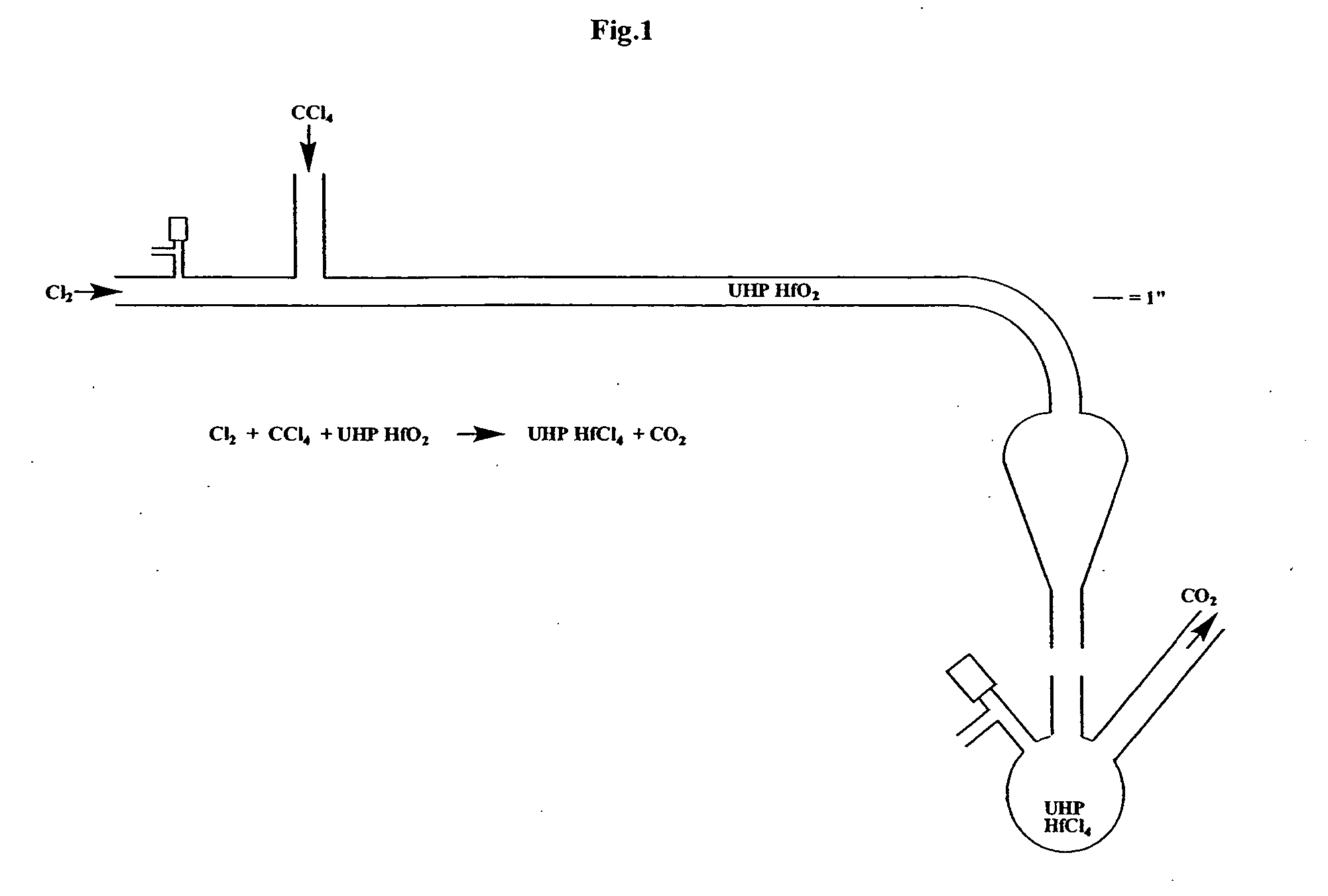Low zirconium, hafnium-containing compositions, processes for the preparation thereof and methods of use thereof
a technology of compositions and low zirconium, which is applied in the field of low zirconium and hafnium-containing compositions, can solve the problems of difficult separation of hafnium and zirconium, unfavorable use of the method, and laborious purification process of hafnium chloride to low zirconium levels, etc., and achieves the desired morphology, less diffusion, and improved properties.
- Summary
- Abstract
- Description
- Claims
- Application Information
AI Technical Summary
Benefits of technology
Problems solved by technology
Method used
Image
Examples
example 1
[0095] In a walk-in fume hood (equipped with MDA Scientific monitors for measuring sub-parts per million levels of Cl2 and COCl2) was placed a quartz apparatus (see FIG. 1). The apparatus was composed of 20 millimeters inner diameter×25 millimeters outer diameter quartz tubing and a pear-shaped quartz bulb similar in structure to a separatory funnel. There were three main openings, namely, one open horizontal tube end, one vertical 24 / 40 female ground quartz joint perpendicular to main tube, and one vertical 24 / 40 male ground quartz joint below the pear-shaped portion. In addition, a 4 millimeter Chem-Cap valve (Chemglass) was located near the open tube end. Quartz wool (about 1 inch plug) was pushed into the apparatus with a rod to a point about 1 inch prior to the onset of curvature of the tube. Five thermocouples (surface mount Omega Type K) were placed on the apparatus at five heating zones. Temperatures were monitored on Thermolyne displays. These zones were then wrapped with h...
example 2
[0100] Within a dry nitrogen atmosphere glove box a dry, three-neck 5 liter round-bottom flask was charged with a stir bar and anhydrous hexanes (2.8 liters). Stirring of the hexanes was commenced, and LiNEt2 (270.8 grams, 3.42 mol) was added. After stirring for 30 minutes, UHP HfCl4 (250 grams, 0.78 mol, 7.1 parts per million Zr) was added in portions while stirring rapidly, (about 60% of the total added over about 15 minutes, with the remaining about 40% over about 90 minutes). Anhydrous inhibitor-free THF (Aldrich, 50 milliliters) was added. The white suspension was stirred rapidly for 16 hours, after which the white solids were allowed to settle (1 hour) yielding a clear yellow supernatant.
[0101] The entire contents of the flask were filtered through a 2 liter fine frit. The remaining white solids were rinsed with hexanes. The solvent was removed from the crude product under reduced pressure, yielding about 400 milliliters of yellow / orange liquid with white residue.
[0102] The ...
PUM
| Property | Measurement | Unit |
|---|---|---|
| temperature | aaaaa | aaaaa |
| temperature | aaaaa | aaaaa |
| temperature | aaaaa | aaaaa |
Abstract
Description
Claims
Application Information
 Login to View More
Login to View More - R&D
- Intellectual Property
- Life Sciences
- Materials
- Tech Scout
- Unparalleled Data Quality
- Higher Quality Content
- 60% Fewer Hallucinations
Browse by: Latest US Patents, China's latest patents, Technical Efficacy Thesaurus, Application Domain, Technology Topic, Popular Technical Reports.
© 2025 PatSnap. All rights reserved.Legal|Privacy policy|Modern Slavery Act Transparency Statement|Sitemap|About US| Contact US: help@patsnap.com

